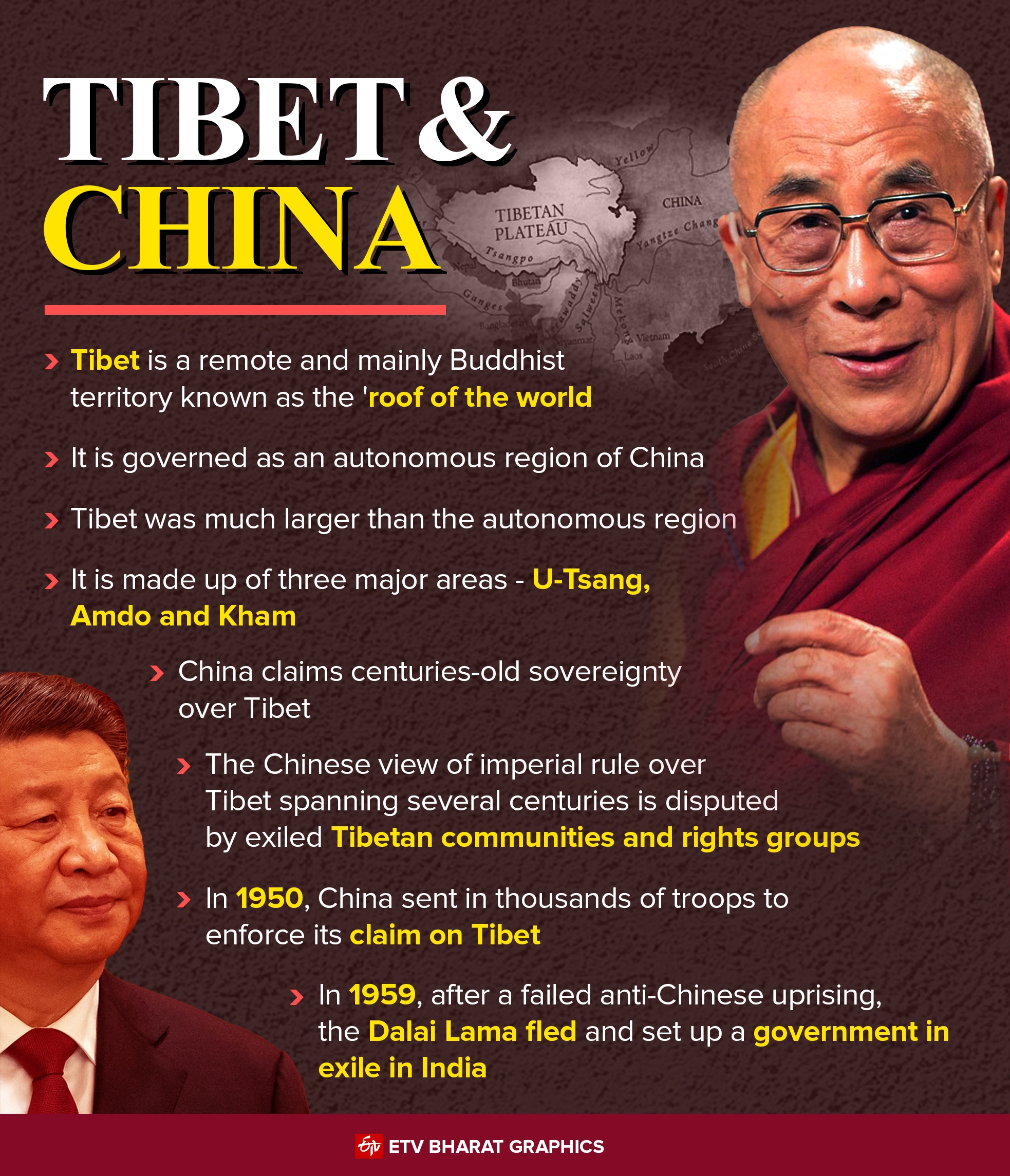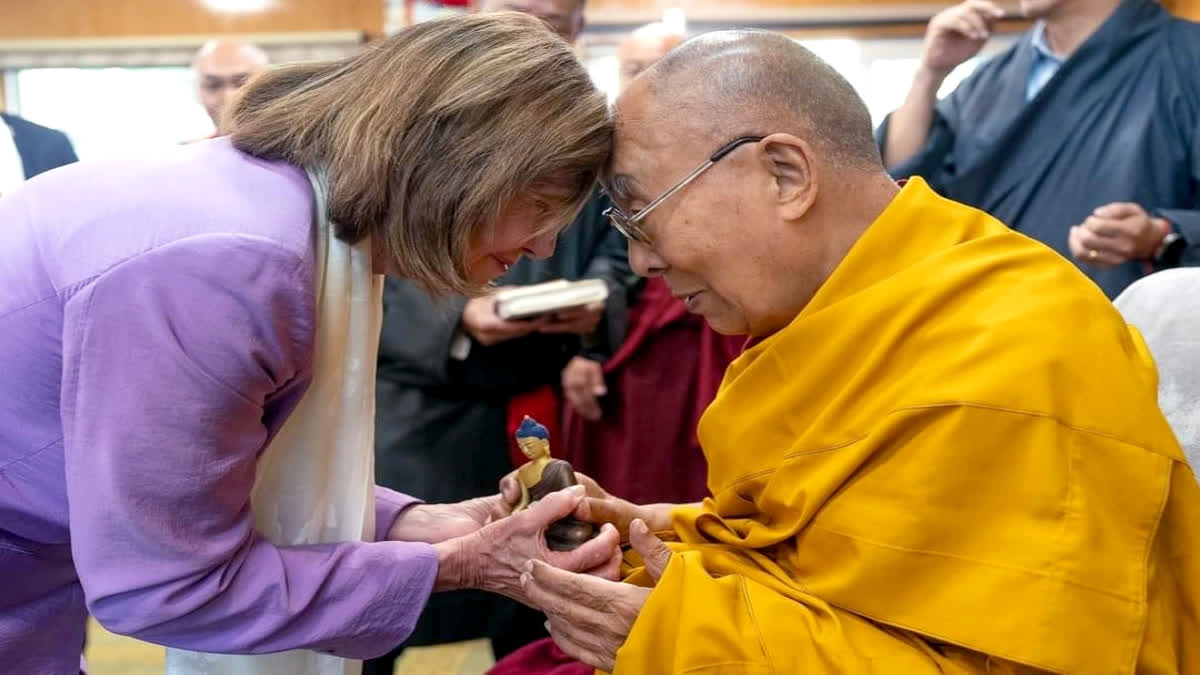Last week, Nancy Pelosi, the former Speaker of the US House of Representatives, was in India as part of a seven-member bipartisan delegation led by Michael McCaul, the Republican Chair of the House Foreign Affairs Committee, to meet the Dalai Lama just prior to him flying to the US for medical treatment.
She spent two days in Dharamshala displaying US support for the Tibetan cause. Apart from meeting the Dalai Lama and the Tibetan government in exile, she also addressed the Tibetan community.
The visit coincided with the passing of the 'Resolve Tibet Act’ by the US House of Representatives. The act seeks to pressure Beijing into resuming dialogue with Tibetan leaders, stalled since 2010. As Micheal McCaul mentioned, 'it will help put the people of Tibet in charge of their own future.'
In her address at Dharamshala, Pelosi criticised Xi Jinping by mentioning, 'His Holiness Dalai Lama, with his message of knowledge, tradition, compassion, purity of soul and love, will live a long time and his legacy will live forever. But you, the President of China, you'll be gone and nobody will give you credit for anything.' The Chinese adversely commented on the visit in Washington, New Delhi and Beijing.
Even before the visit, the Chinese Minister-Counsellor Zhou Zheng of their embassy in Washington mentioned, 'The visit interferes with China's internal affairs, violates China's sovereignty and territorial integrity. China firmly deplores it. Xizang (Tibet) is an integral part of Chinese territory since the Yuan Dynasty in the 13th century.' He even advised the US government to cancel the visit, which was ignored.
The Chinese Foreign Ministry spokesperson, Lin Jian, stated in Beijing, 'The 14th Dalai Lama is not a pure religious figure, but a political exile engaged in anti-China separatist activities under the cloak of religion.' The Chinese embassy in Delhi described the Dalai Lama as a 'political exile involved in activities against China's interests, veiled under religious pretext.'

An Indian press note mentioned that the delegation met Prime Minister Narendra Modi and congratulated him on his historic third term. It added, 'They expressed deep appreciation for the scale, fairness and transparency of the recently concluded world's largest democratic electoral exercise in India.’ The group also interacted with India's foreign minister, Dr S Jaishankar, displaying Indian support to the delegation.
The PM in a post on X stated, 'Had a very good exchange of views with friends from the US Congress in a delegation led by @RepMcCaul, Chairman of @HouseForeignGOP. Deeply value the strong bipartisan support in advancing India-US Comprehensive Global Strategic Partnership.' There was no 'official' mention on the visit to Dharamshala.
The Dalai Lama was anyway proceeding to the US for medical treatment and hence, he could have been met by the same delegation there. But coming all the way to Dharamshala could not have been without meaning. Further, the visit would not have occurred without the tacit approval of the Indian government. It does convey specific messages.
Firstly, it conveys India's support to the Dalai Lama and his 'religious' cause. The Indian foreign office spokesperson affirmed the same by mentioning, 'The Government of India's position on His Holiness the Dalai Lama is clear and consistent. He is a revered religious leader and is deeply respected by the people of India. His Holiness is accorded due courtesies and freedom to conduct his religious and spiritual activities.' Secondly, it displays that the US and India are close allies and have convergence on multiple issues, including Tibet and China.
Thirdly, the delegation conveyed a vital message to the global Tibetan community on the most critical issue facing them, which is the selection of the fifteenth Dalai Lama (the current Dalai Lama is 88). The Chinese are desperate to nominate his successor, implying appointing a puppet, whom they can control and manipulate. China is aware that without the Dalai Lama in its control, its hold over Tibet is incomplete.
China appointed the Panchen Lama, second only to the Dalai Lama in 1995. He too swore allegiance to the Dalai Lama, soon after being appointed. Since then, his whereabouts are unknown. For almost a quarter of a century, he remains a political prisoner. They are seeking the same for the next Dalai Lama. The current Dalai Lama has not given any indication of his successor. He has stated that he may not even be reborn. However, he has clarified that he will not take rebirth in Chinese-controlled territory.
The delegation coming to India and announcing the passing of the 'Resolve Tibet Act,' which also includes the 'rights of the Tibetan people to self-determination and human rights,' is a boost in the arm for Tibetans across the globe. The act is currently awaiting the signature of the US President.
As per the Central Tibetan Administration the act 'recognises and addresses the socio-cultural identity of the Tibetan people, in particular their distinct historical, cultural, religious, and linguistic identity.' This provides them global support in appointing a successor, ignoring Chinese claims.
In 2020, US President Joe Biden had announced, during campaigning that he would meet the Dalai Lama. The upcoming medical treatment of the Dalai Lama in the US would be an opportune moment and provide a boost to Biden's campaign. If done, the message to China could not have been clearer.
Nancy Pelosi's earlier visit to Taiwan as the US House speaker on 02 August 2022, sparked tensions in the Taiwan straits, not witnessed for decades. China launched ballistic missiles over the island while conducting naval and air operations in its vicinity. Few missiles even fell in Japanese waters resulting in a strong retort. The propensity of cyberattacks was also far higher. All this because Pelosi's visit coincided with the Chinese National Congress where Xi Jinping was seeking a historical third term.
India is not Taiwan and cannot be suppressed the way Taipei was post the visit of Pelosi, the former speaker of the US House of Representatives, Kevin McCarthy's visit in April this year and after the swearing-in of the current government in Taipei in May. India has held onto its own militarily against the Chinese and responded with equal vigour. It has conveyed to Beijing that unless the border issue is resolved, the bilateral ties can never be normal, implying that it will back anti-China actions.
Permitting this visit and providing space for the delegation to attack Xi Jinping was another manner of conveying to China that ties are frayed and the onus of restoring them rests on China. Further, the government, politically weaker than the last, continues to display that its diplomatic and military policies remain unchanged. It is now for China to determine the track it chooses, continued hostility or restoring bilateral ties.



